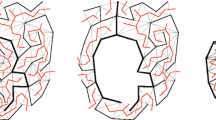Abstract
Thorup and Zwick, in the seminal paper [Journal of ACM, 52(1), 2005, pp 1-24], showed that a weighted undirected graph on n vertices can be preprocessed in subcubic time to design a data structure which occupies only subquadratic space, and yet, for any pair of vertices, can answer distance query approximately in constant time. The data structure is termed as approximate distance oracle. Subsequently, there has been improvement in their preprocessing time, and presently the best known algorithms [4,3] achieve expected O(n 2) preprocessing time for these oracles. For a class of graphs, these algorithms indeed run in Θ(n 2) time. In this paper, we are able to break this quadratic barrier at the expense of introducing a (small) constant additive error for unweighted graphs. In achieving this goal, we have been able to preserve the optimal size-stretch trade offs of the oracles. One of our algorithms can be extended to weighted graphs, where the additive error becomes 2 ·w max (u,v) - here w max (u,v) is the heaviest edge in the shortest path between vertices u, v.
Access this chapter
Tax calculation will be finalised at checkout
Purchases are for personal use only
Preview
Unable to display preview. Download preview PDF.
Similar content being viewed by others
References
Aingworth, D., Chekuri, C., Indyk, P., Motwani, R.: Fast estimation of diameter and shortest paths(without matrix multiplication). SIAM Journal on Computing 28, 1167–1181 (1999)
Baswana, S., Goyal, V., Sen, S.: All-pairs nearly 2-approximate shortest paths in
 time. In: Proceedings of 22nd Annual Symposium on Theoretical Aspect of Computer Science. LNCS, vol. 3404, pp. 666–679. Springer, Heidelberg (2005)
time. In: Proceedings of 22nd Annual Symposium on Theoretical Aspect of Computer Science. LNCS, vol. 3404, pp. 666–679. Springer, Heidelberg (2005)Baswana, S., Kavitha, T.: Faster algorithms for approximate distance oracles and all-pairs small stretch paths. In: Proceedings of the 47th IEEE Annual Symposium on Foundations of Computer Science (FOCS), pp. 591–602 (2006)
Baswana, S., Sen, S.: Approximate distance oracles for unweighted graphs in expected O(n 2) time. ACM Transactions on Algorithms 2, 557–577 (2006)
Baswana, S., Telikepalli, K., Mehlhorn, K., Pettie, S.: New construction of (α,β)-spanners and purely additive spanners. In: Proceedings of 16th Annual ACM-SIAM Symposium on Discrete Algorithms (SODA), pp. 672–681 (2005)
Chan, T.M.: More algorithms for all-pairs shortest paths in weighted graphs. In: Proceedings of 39th Annual ACM Symposium on Theory of Computing, pp. 590–598 (2007)
Cohen, E., Zwick, U.: All-pairs small stretch paths. Journal of Algorithms 38, 335–353 (2001)
Dor, D., Halperin, S., Zwick, U.: All pairs almost shortest paths. Siam Journal on Computing 29, 1740–1759 (2000)
Erdős, P.: Extremal problems in graph theory. In: Theory of Graphs and its Applications (Proc. Sympos. Smolenice,1963), pp. 29–36. House Czechoslovak Acad. Sci, Prague (1964)URL, 29
Halperin, S., Zwick, U.: Linear time deterministic algorithm for computing spanners for unweighted graphs (unpublished manuscript) (1996)
Roditty, L., Thorup, M., Zwick, U.: Deterministic construction of approximate distance oracles and spanners. In: Caires, L., Italiano, G.F., Monteiro, L., Palamidessi, C., Yung, M. (eds.) ICALP 2005. LNCS, vol. 3580, pp. 261–272. Springer, Heidelberg (2005)
Thorup, M., Zwick, U.: Approximate distance oracles. Journal of Association of Computing Machinery 52, 1–24 (2005)
Author information
Authors and Affiliations
Editor information
Editors and Affiliations
Rights and permissions
Copyright information
© 2008 Springer-Verlag Berlin Heidelberg
About this paper
Cite this paper
Baswana, S., Gaur, A., Sen, S., Upadhyay, J. (2008). Distance Oracles for Unweighted Graphs: Breaking the Quadratic Barrier with Constant Additive Error. In: Aceto, L., Damgård, I., Goldberg, L.A., Halldórsson, M.M., Ingólfsdóttir, A., Walukiewicz, I. (eds) Automata, Languages and Programming. ICALP 2008. Lecture Notes in Computer Science, vol 5125. Springer, Berlin, Heidelberg. https://doi.org/10.1007/978-3-540-70575-8_50
Download citation
DOI: https://doi.org/10.1007/978-3-540-70575-8_50
Publisher Name: Springer, Berlin, Heidelberg
Print ISBN: 978-3-540-70574-1
Online ISBN: 978-3-540-70575-8
eBook Packages: Computer ScienceComputer Science (R0)





 time. In: Proceedings of 22nd Annual Symposium on Theoretical Aspect of Computer Science. LNCS, vol. 3404, pp. 666–679. Springer, Heidelberg (2005)
time. In: Proceedings of 22nd Annual Symposium on Theoretical Aspect of Computer Science. LNCS, vol. 3404, pp. 666–679. Springer, Heidelberg (2005)